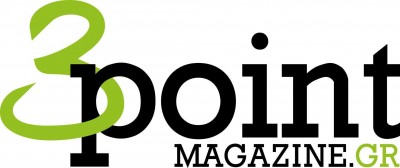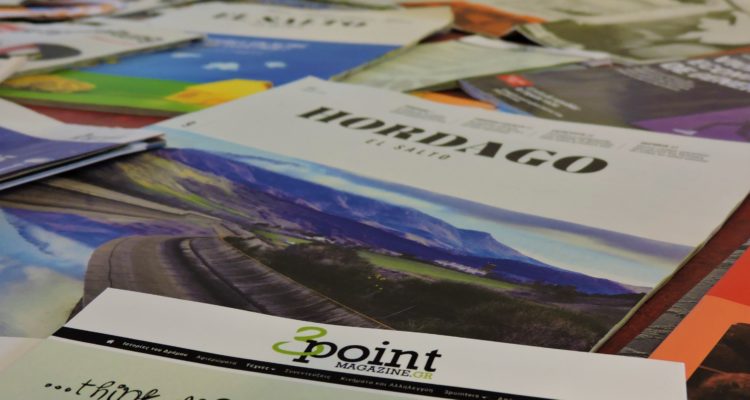Delegates to Paris:
Alexandros Vakoulas, Melina Velimezi, Kostas Papantoniou
Is it possible for the cooperative media to work together? In an attempt to answer this question in practice, more than 20 cooperative media from all over Europe are brought together at an eco-farm, which operates as a social place with multiple uses, near Paris. The purpose of the meeting was that the promise for “continuity”, that has been given a few months before in Greece at Agricultural University where the 4th European Social Solidarity Economy Congress was held, should be more than words.
During the three days of the meeting, the conversations had the cooperation of the media in their focus, targeting to the formation of a network based on the need for independent information rather than business interests. From Greece two media took part, the EfSyn (journalists’ journal) and 3pointmagazine with three delegates.
Why now?
In a period when the whole world looks for alternatives in politics and society, media could not be an exception.
Media do not exist anymore in the form we used to know. The printed press loses its power, being unable to adjust to the technological development and the reading public is constantly shrinking, resulting in increase of unemployment and decline in the quality of information.
At the same time, this situation does not seem to be balanced by the sharp rise of web media. The quantitative increase by the proliferation of sites and daily information sources, do not lead to a quality development, in the interests of employees and readers. On the contrary, more and more sites are created, looking for an effortless “click” and employing poorly paid employees, who are usually not paid, being forced to be patient in order not to be fired, “Many people looking for work”.
Unemployment and murders
Problems in press industry are particularly reflected in the countries of South Europe. Significantly, in Italy among 100.000 journalists, hardly half of them pay contribution as such, in Portugal 1 in 3 employees in press is paid 300 euros, in Spain thousands of journalists changed their profession and more than 30,000 are unemployed, in France 1 in 4 journalists is a freelancer or unemployed and in Greece 50% is also out of active journalism. The newspaper “Avgi” has published more detailed article entitled “Proletariazation of journalism and information”.
In parallel, the journalism becomes more and more controllable. According to a recent research of Guardian “The global freedom of press is at the minimum level since the beginning of this century”. There have been even murders of journalists. The murder of Slovak journalist Jan Kuciak who was murdered with his partner in his home, as he was about to publish an article about high-level corruption, involving mafia and politicians, as well the murder of Daphne Caruana Galizia, the journalist who reported on the connection of the wife of prime minister Muscat to a Panama-registered offshore company are the most recent tragic examples.
“What is expected to be an alternative media?”
The first question referred in the room of “La Bergerie de Villarceaux”, the eco-farm which hosted us in Paris, was “what is expected to be an alternative media?”. It is followed by some other questions: “Who are we?”, “Why are we independent?”, “Why someone has to read us?”, “What is the value of this gathering?”.
In addition, we discussed how alternative media can claim their own space, while big media owned by powerful businessmen operate as malls and release reportage with alternative content, trying to absorb the biggest possible share of the audience.
Before trying to respond the questions, we introduced ourselves. El Salto, Altreconomia, Stir, Taz, Political Critique, Socioeco. The number of names, which are written and pronounced differently, indicated the range of participation, from German to Italy and from Poland to Spain.
Common challenges, common difficulties
Although the background differs from country to country, by the end of the meeting we noticed that we have lots of thing in common. Even someone live in Greece of memoranda, even in strong Germany, the attempt to establish a different information model is extremely difficult.
At first, a media is not an average business. The product is not sold as easy as the product of a super market. Additionally, even when it is sold, it is not for granted that it will provide the necessary incomes for the salaries of the journalists.
Do it like Spain
The conversations at first was held in an auditorium and then at tables, where journalists/ representatives of media were separated into groups. A different subject was discussed in each table: economic models, ways of cooperation, common reportage, cooperative campaigns. Each group passed through all the tables and the subjects and this way, every journalist/representative expressed their view in each subject, during the three days of the meeting.
Every phrase started with “we”. After the “we”, one experience from each venture was narrated. El Salto, a Spanish printed press, as Mai said, is the result of coalition of 20 ventures in Spain. “As the time had passed we noticed that it was more and more difficult for each media to stand alone”, she mentioned this as one of the two basic reasons they decided to come together. The second reason was their intention to enforce the voice of these media and spread their press releases.
The “El Salto” could be an example. Although many cooperative media exist in Greece, which of them cooperate with each other? How many of them are viable? The “El Salto” manage to cover relatively decent wages for the employees. However, unless they had joined each other, none of the 20 media would have managed to be viable. In addition, they managed only 6% of incomes derived from ads while the rest incomes derived from subscriptions.
The concept of partnership of El Salto, could be applied in a European level. The basic question is the frame of such a partnership. The identity of a venture that surpasses the borders, aimed at readers in Croatia as well in France and in Great Britain at the same time and gains acceptance.
Some basic principles have been agreed. The network of cooperative media must be based on the spirit of cooperation, solidarity, social justice, direct democratic structure, environmentally awareness as well antifacist and antiracist characteristics. A necessary condition in our days.
A further key factor is this venture not to be another alternative venture with many sophisticated words accompanied them. We don’t create something just for ourselves but mainly for our readers. Therefore, for all we write that we want to happen somehow, sometime in society, everybody must understand them through a simple and accessible language. “cooperative media, without bosses, but not boring”.
How it could operate
It would not be sensible for someone to state that it is easy so many media from different countries to coordinate. On the other hand, especially now when dark sides of the history are revived with the rise of the far-right almost everywhere across Europe, it would not be sensible for someone to state such a network “is over our needs”.
The texts that could be written on the network could stimulate a different current of thought. Ask questions, raise awareness, incite, engage in dialogue, or even overturn stable and backward-looking concepts that have once again swept the poorest masses.
Communicating each other, each media has the opportunity to understand better the current conditions in the country, where another media of the network operates. The “3point” can give an image and a point of view for what happens in Greece and gain an image of what happens in Italy through the point of view of Alterconomia and media in other countries accordingly. The media of the network can exchange both knowledge and articles. In this way, readers proceed the events of each country, as well its people. A social issue in Greece are introduced to someone who may be interested in it, in Italy.
The cooperation of many versus the power of a few
Our media will not have and do not want to ever have the economic power of the owners of big mass media, who own football teams, pharmaceutical industries and large ships. Our media will always chase to realize their social project to declare the voice of the silent. To promote the less known. To enlighten their co-citizens. To underline the correlations. With only power their cooperation, to serve all the previous purposes with significant reports. To collaborate to complete reports that go beyond the boundaries of one country. For example, the issue of gold mining in Skouries could not be limited. On the contrary, by means of a media partnership, a bigger folder with investigations, where gold mining happens can be published.
In parallel, an -initially- European network of cooperative media could provide useful answers and arguments on cases such as a xhenophobic rhetoric of a prime-minister, an Orban, each fascist party, each Golden Dawn.
The first republish became reality
The cooperative media took the decision to come together again and make an effort to find the valuable space and time, despite the requirements of their daily function, in order to coordinate for the formation of the network.
The first republish among the media became reality. There are many things to be done, but we are still in the beginning. Actually, we have reached the point of starting to exist. Claiming the existing circumstances lies on the hand of each media in order to form a notable venture in the history of journalism, while they keep in mind the reasons and the special meaning of the creation of a network of independent media without bosses on a European level.
Cooperative Greek media are part of this perspective, they can contribute significantly and the can be more. The venture is open to anyone who operate without bosses, independently and against discrimination. Let us thought about the number of media with these characteristics, thus we can conceive the potential that can be developed on an international, started of a European level.
The next step
The meeting in Paris revealed that there might be a continuity. Journalists, who used to work in giant media and left them to begin their own effort, took part in it. They prove in practice that they want an alternative journalism, for a different world. To prove in practice that what we can do ourselves, we also can do along with others. We want, we can? The time will give the answers, after we answer whether we want to be the ones who do something different or the ones who make the difference.






Το 3point magazine είναι ένα οριζόντια δομημένο μέσο που πιστεύει ότι η γνώμη όλων έχει αξία και επιδιώκει την έκφρασή της. Επικροτεί τα σχόλια, την κριτική και την ελεύθερη έκφραση των αναγνωστών του επιδιώκοντας την αμφίδρομη επικοινωνία μαζί τους.
Σε μια εποχή όμως που ο διάλογος τείνει να γίνεται με όρους ανθρωποφαγίας και απαξίωσης προς πρόσωπα και θεσμούς, το 3point δεν επιθυμεί να συμμετέχει. Για τον λόγο αυτόν σχόλια ρατσιστικού, υβριστικού, προσβλητικού, σεξιστικού περιεχομένου θα σβήνονται χωρίς ειδοποίηση του εκφραστή τους.
Ακόμα, το 3point magazine έχει θέσει εαυτόν απέναντι στο φασισμό και τις ποικίλες εκφράσεις του. Έτσι, σχόλια ανάλογου περιεχομένου θα έχουν την ίδια μοίρα με τα ανωτέρω, τη γνωριμία τους με το "delete".
Τέλος, τα ενυπόγραφα άρθρα εκφράζουν το συντάκτη τους και δε συμπίπτουν κατ' ανάγκην με την άποψη του 3point.